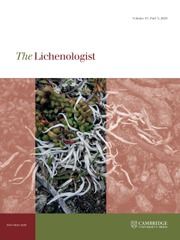Crossref Citations
This article has been cited by the following publications. This list is generated based on data provided by Crossref.
Hafellner, Josef
1986.
Progress in Botany.
p.
316.
Ott, Sieglinde
1987.
Sexual reproduction and developmental adaptations in Xanthoria parietina.
Nordic Journal of Botany,
Vol. 7,
Issue. 2,
p.
219.
Fiechter, Elisabeth
and
Honegger, Rosmarie
1987.
Seasonal variations in the fine structure ofHypogymnia physodes (lichenizedAscomycetes) and itsTrebouxia photobiont.
Plant Systematics and Evolution,
Vol. 158,
Issue. 2-4,
p.
249.
Peveling, Elisabeth
1988.
Beziehungen zwischen den Symbiosepartnern in Flechten.
Naturwissenschaften,
Vol. 75,
Issue. 2,
p.
77.
JAHNS, H. M.
1988.
The establishment, individuality and growth of lichen thalli.
Botanical Journal of the Linnean Society,
Vol. 96,
Issue. 1,
p.
21.
HAWKSWORTH, D. L.
1988.
The variety of fungal-algal symbioses, their evolutionary significance, and the nature of lichens.
Botanical Journal of the Linnean Society,
Vol. 96,
Issue. 1,
p.
3.
Sanders, William
1989.
GROWTH AND DEVELOPMENT OF THE RETICULATE THALLUS IN THE LICHEN RAMALINA MENZIESII.
American Journal of Botany,
Vol. 76,
Issue. 5,
p.
666.
Stocker-W�rg�tter, Elfie
and
T�rk, Roman
1989.
Artificial cultures of the cyanobacterial lichenPeltigera didactyla (Peltigeraceae) in the natural environment.
Plant Systematics and Evolution,
Vol. 165,
Issue. 1-2,
p.
39.
Mattsson, Jan‐Eric
and
Lumbsch, H. Thorsten
1989.
THE USE OF THE SPECIES PAIR CONCEPT IN LICHEN TAXONOMY.
TAXON,
Vol. 38,
Issue. 2,
p.
238.
Stocker‐Wörgötter, Elfie
and
Türk, R.
1990.
Thallus Formation of the Cyanobacterial Lichen Peltigera didactyla from Soredia under Laboratory Conditions.
Botanica Acta,
Vol. 103,
Issue. 3,
p.
315.
Walton, D. W. H.
1990.
Antarctic Ecosystems.
p.
51.
Stocker-Wörgötter, Elfie
1991.
Thallus formation of two cyanobacterial lichens:Peltigera didactylaandPeltigera praetextata, under laboratory conditions.
Bulletin de la Société Botanique de France. Lettres Botaniques,
Vol. 138,
Issue. 3,
p.
179.
Armaleo, Daniele
and
Clerc, Philippe
1991.
Lichen chimeras: DNA analysis suggests that one fungus forms two morphotypes.
Experimental Mycology,
Vol. 15,
Issue. 1,
p.
1.
HONEGGER, ROSMARIE
1993.
Developmental biology of lichens.
New Phytologist,
Vol. 125,
Issue. 4,
p.
659.
Jahns, H. M.
1993.
Culture experiments with lichens.
Plant Systematics and Evolution,
Vol. 187,
Issue. 1-4,
p.
145.
Hyvärinen, M.
Halonen, P.
and
Kauppi, M.
1999.
Habitat type and primary colonisation of annual shoots of conifer saplings by epiphytic lichens.
Nordic Journal of Botany,
Vol. 19,
Issue. 4,
p.
505.
Zoller, S.
Frey, B.
and
Scheidegger, C.
2000.
Juvenile Development and Diaspore Survival in the Threatened Epiphytic Lichen Species Sticta fuliginosa, Leptogium saturninum and Menegazzia terebrata: Conclusions for in situ Conservation.
Plant Biology,
Vol. 2,
Issue. 4,
p.
496.
Honegger, R.
2001.
Fungal Associations.
p.
165.
SANDERS, WILLIAM B.
2001.
Lichens: The Interface between Mycology and Plant Morphology.
BioScience,
Vol. 51,
Issue. 12,
p.
1025.
Stocker-Wörgötter, Elfriede
2001.
Experimental Lichenology and Microbiology of Lichens: Culture Experiments, Secondary Chemistry of Cultured Mycobionts, Resynthesis, and Thallus Morphogenesis.
The Bryologist,
Vol. 104,
Issue. 4,
p.
576.


